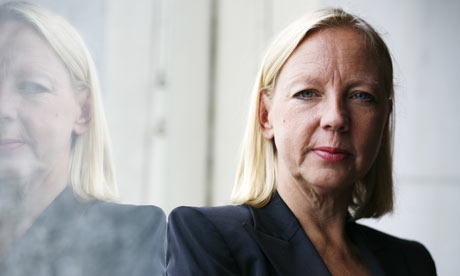
Today a chef called Simon Boyle gets a cheque for £60,000, and about time too. Boyle, you may remember, went before BBC TV Dragon's Den last year to try and raise investment for his restaurant and hospitality social enterprise, Beyond Boyle. The Dragons were impressed by his home-baked bread, but even more stunned by his success in training and hiring homeless people. Even the scary tycoon Deborah Meaden was reduced to a lump-throated whimper: "It's fantastic!"
But would they give Boyle any cash? "Outside of the Den," said a clearly moved Dragon Peter Jones, "You'd hear me say I'm in." Alas, as they were in the Den, and as the aim is, theoretically, pure profit maximisation, he was going to keep his money firmly in his wallet. The implication was clear: business is business, good causes are good causes, and never the twain shall meet. Business is a ruthless and self-interested affair, to be taken deadly seriously; creating social value is what we do when we are in a sweeter, fluffier, more recklessly altruistic place.
As I say, Boyle gets his money today, from an altogether more progressive and enlightened source: the Spark investment programme.
Superficially, it is a bit like the TV programme: 15 small firms with innovative ideas pitch before a panel of entrepreneurs and businesspeople with a pot of around £600,000 to give out. The successful pitchers stood to win cash and advice worth tens of thousand of pounds. But that's where the similarities with the TV show end.
Spark, backed by the Department for Communities and Local Government, The TREES Group, Big Issue Invest, Eastside Consulting, Places for People, BT and PricewaterhouseCoopers, is aimed at social enterprises which prevent and tackle homelessness. In most cases these enterprises employ or train homeless and disadvantaged people. At their core is a mission to create social value: profit is essential, growth is good, but they are only part of the deal. Investors look for evidence of positive social change, not merely stupendously high financial returns. You might call Spark an ethical Dragon's Den, even an anti-Dragon's Den.
Even so, the Spark "dragons" were fastidiously business-like. Idealism, passion, and raw potential were expected of the pitchers (who duly delivered). But there was little evidence of sentimentality or indulgence in return. Indeed, to this outsider's eyes there was a surprisingly fierce and un-charitable attention to seemingly mundane detail – cash flow, VAT, governance, market analysis. You might be an energetic and persuasive advocate for homeless people, but if your overheads were out of control or your business plan didn't stack up, tough.
It felt very different to a traditional charity-donor relationship. Much good-cause giving is predicated on the size of a charity's good intentions, rather than the viability of its financial model or the quality of the outcomes it achieves. The explicit aim of the Spark investment, it seemed to me, is anti-charity: to make service users productively involved in their own recovery, as employees in sustainable businesses rather than passive recipients of welfare aid.
That commitment to creating social value – crudely, to employing people many conventional firms would shy away from – means they may not be, as Jones recognises, as conventionally profitable. But it delivers potentially lucrative returns on investment in terms of individual skills development and self-esteem, and more broadly, in reducing welfare dependency. Local authorities and NHS primary care trusts might consider the returns on offer from social enterprises when they let contracts to local businessess.
So who else got Spark cash? A number of good-looking businesses employing and supporting homeless people, including: Aspire Oxford, a firm of landscape gardeners; Winter Willow, a Cambridge-based business with a nice line in willow coffins and garden furniture; Bellerophonic, a steel-welding business in Southampton; and the House of St Barnabas, a life skills programme operating out of a stunningly beautiful Georgian house in Soho, London. You can see the full list (and their films) on the Spark website. Good luck to them all.
• Patrick Butler is head of society, health and education at The Guardian







